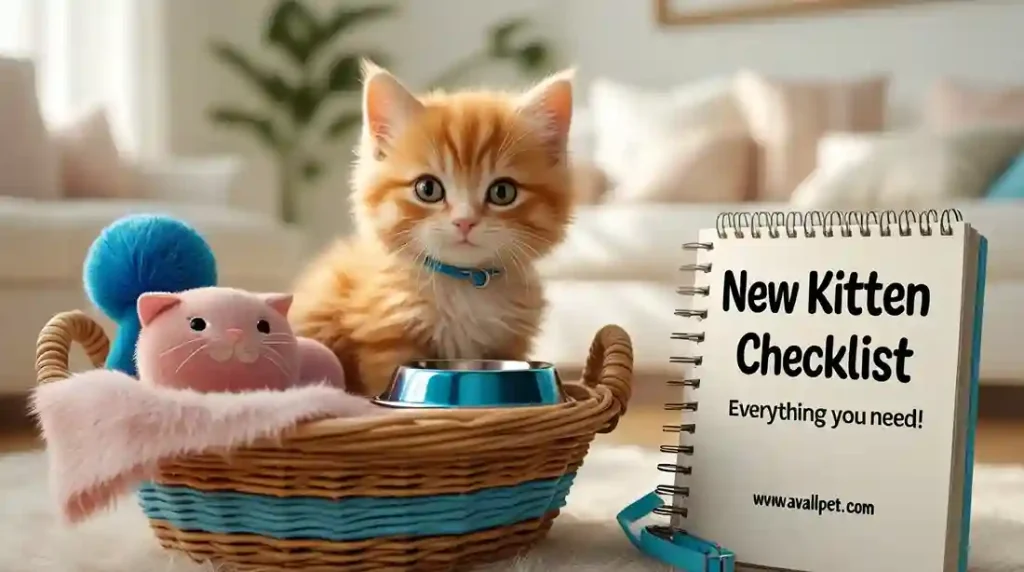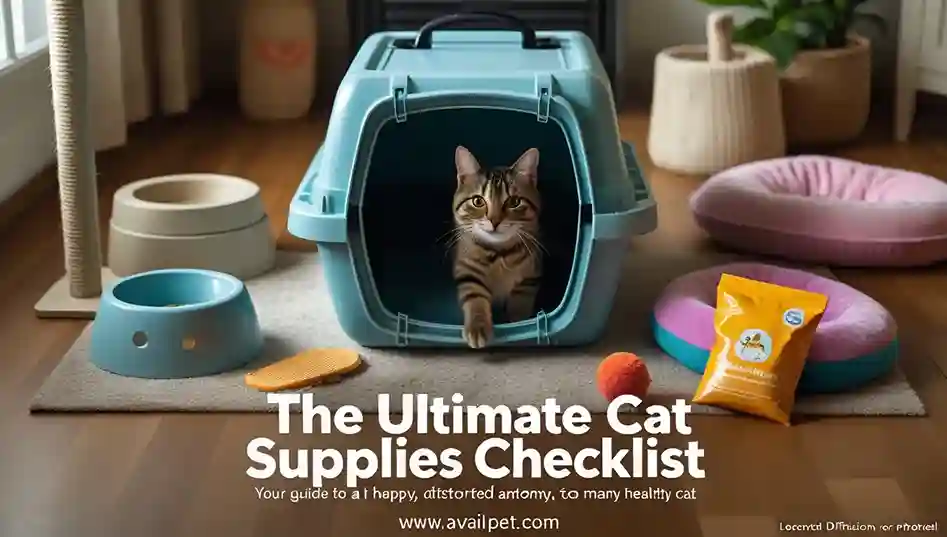🔑 Key Takeaways: Kitten First Vet Visit
- When to Go: Schedule within the first week of bringing your kitten home.
- What to Bring: Any adoption records, a fresh stool sample, and your kitten in a secure carrier.
- The Exam Includes: Weight check, physical exam from nose to tail, and a fecal test.
- Be Prepared To Discuss: Vaccinations, deworming, spay/neuter, and diet.
Introduction: Your Guide to a Successful Kitten First Vet Visit
The excitement of bringing home a new kitten is unmatched. But amidst the joy lies a crucial responsibility: scheduling the kitten first vet visit. This initial appointment is the most important investment you can make in your new pet’s long-term health and wellbeing.
Think of it less as an exam and more as a “welcome to the world” health celebration. This comprehensive, vet-reviewed guide will walk you through every step of preparing for your kitten first vet visit, from creating an essential checklist to understanding the procedures and costs. Our goal at AvailPet is to transform this milestone from a source of anxiety into an empowering experience, ensuring you and your veterinarian become partners in your kitten’s care from day one.
When to Schedule Your Kitten’s First Vet Visit
Timing is everything when it comes to your new pet’s health. We strongly recommend scheduling the kitten first vet visit within the first 48 to 72 hours of bringing them home. This isn’t just a suggestion—it’s a critical step for responsible pet ownership.
Here’s why this timing is so essential:
- Establish a Health Baseline: The vet can identify any underlying congenital issues or early signs of illness that might not be apparent yet.
- Early Problem Detection: Kittens are vulnerable. Catching conditions like parasites, upper respiratory infections, or other common kitten ailments early can prevent them from becoming severe and more costly to treat.
- Immediate Preventative Care: This visit allows you to start a deworming schedule and begin core vaccinations without delay, building their immune system during a crucial developmental window.
- Peace of Mind: Most importantly, it gives you confidence that your new family member is starting their life with you on a healthy paw.
Even if your kitten appears perfectly healthy and came from a reputable source, this initial check-up is non-negotiable. It sets the stage for all future care and begins a vital health record.
The Ultimate First Vet Visit Checklist
Being prepared is the best way to ensure a smooth and successful visit for both you and your kitten. Use this comprehensive checklist to guarantee you have everything you need.
What to Bring:
- Your Kitten in a Secure Carrier: This is non-negotiable for safety. A hard-sided carrier like the Sleepypod Air Mobile Pet Carrier provides security and meets airline standards, while a soft-sided option like the AmazonBasics Soft-Sided Pet Travel Carrier is lightweight and comfortable for car trips.
- All Documentation: Bring any paperwork you received from the breeder or shelter, including previous vaccination records, deworming history, and microchip information.
- A Fresh Stool Sample: Collect a small, fresh sample (from within the last 12 hours). Using a disposable stool sample container with a built-in scoop makes this messy task much easier and more hygienic.
- A List of Questions: Keep your notes organized in a dedicated pet health journal or use your phone’s notes app.
- Your Phone: Useful for taking notes, photos of products the vet recommends, or even recording important instructions (with your vet’s permission).
Tips for a Calm Kitten:
- Familiar Comfort: Place a familiar blanket or a soft t-shirt with your scent in the carrier to provide comfort.
- Calming Aids: Consider using a calming pheromone spray like Feliway Classic Spray in the carrier about 15 minutes before travel to help naturally reduce stress and anxiety.
- Treat Motivation: Bring your kitten’s favorite treats to reward calm behavior. High-value, soft treats like Purina FortiFlora Probiotic Nutritional Supplements are often irresistible and can even support digestive health.
10 Essential Questions to Ask During the First Vet Visit
Walking into the appointment with a prepared list of questions ensures you cover all the critical topics for your kitten’s health. Don’t be shy—a good veterinarian will welcome your engagement. Here are the key questions to ask:
- What is the recommended vaccination schedule for my kitten? (This opens a conversation about core vs. non-core vaccines).
- What parasite prevention do you recommend (for fleas, ticks, heartworm, and intestinal worms), and when should we start?
- What is the best diet for my kitten’s breed and age? Discuss specific nutritional needs and portion sizes.
- At what age should I schedule my kitten’s spay or neuter procedure?
- What are the signs of illness I should watch for in a young kitten?
- What is the best way to introduce my kitten to other pets at home?
- Can you demonstrate how to properly trim my kitten’s nails and clean their ears?
- Do you recommend pet insurance, and if so, are there providers you suggest?
- What should I know about dental care for my kitten as they grow?
- What is the best form of identification—microchip, collar tags, or both?
Having these questions written down will help you make the most of this important appointment and ensure you leave feeling confident about your kitten’s care plan.
What to Expect During the Visit (The Step-by-Step)
Knowing what will happen during the appointment can ease your mind and help you feel more prepared. Here’s a breakdown of the typical process for a kitten first vet visit:
1. The History & Discussion
The veterinarian or technician will start by asking you a series of questions about your kitten’s:
- Origin and History: Where did you get them? What is known about their parents or littermates?
- Diet: What brand and type of food are they eating, and how much?
- Behavior: Are they using the litter box consistently? Are they playful, vocal, hiding?
- Environment: Are there other pets in the home? Do you plan for them to be indoor-only or have outdoor access?
2. The Nose-to-Tail Physical Exam
This is the core of the visit. The vet will conduct a thorough examination, checking:
- Eyes, Ears, and Nose: For any discharge, redness, or signs of infection.
- Mouth and Teeth: Checking the gum color (a sign of health) and looking for any dental abnormalities.
- Heart and Lungs: Using a stethoscope to listen for murmurs or abnormal breathing sounds.
- Abdomen: Gently palpating (feeling) the organs for any abnormalities.
- Skin and Coat: Looking for signs of fleas, ticks, dryness, or hair loss.
- Joints and Muscles: Ensuring proper movement and development.
3. Diagnostic & Preventative Care
Based on the exam and history, the vet will typically recommend:
- Fecal Exam: To check for intestinal parasites like roundworms, hookworms, and giardia.
- Vaccinations: The first round of core vaccines, usually the FVRCP (which protects against several upper respiratory viruses and panleukopenia).
- Deworming: A broad-spectrum deworming medication is often administered, even if the fecal test is negative, as some parasites shed eggs intermittently.
This structured process ensures every aspect of your kitten’s health is assessed, setting a solid foundation for their future well-being.
Understanding the Cost of the First Vet Visit
It’s helpful to have a realistic expectation of the investment involved in your kitten’s initial healthcare. The cost can vary based on your geographic location and the veterinary clinic, but you can generally expect the first vet visit to range from $100 to $250.
This initial investment typically covers:
- The Office Visit/Exam Fee: The cost of the veterinarian’s time and expertise for the comprehensive physical exam.
- Core Vaccinations: The first dose of the FVRCP vaccine.
- Diagnostic Testing: The fecal exam to check for parasites.
- Preventative Medications: The first round of deworming medication.
While this may seem like a significant upfront cost, it’s important to view it as a crucial investment in preventative care. Identifying and addressing potential health issues early, such as parasites or congenital conditions, can prevent far more expensive emergency treatments down the line.
To help manage future healthcare costs, your veterinarian will likely discuss the option of pet insurance. Enrolling your kitten while they are young and healthy is the most effective way to ensure coverage for unexpected illnesses or accidents throughout their life.
Kitten First Vet Visit FAQs
How much does a kitten’s first vet visit cost?
The cost typically ranges from $100 to $250, depending on your location and the clinic. This usually includes the physical exam, first vaccinations, a fecal test, and initial deworming medication. It’s always a good idea to call ahead for a detailed price estimate.
What happens if my kitten has fleas or worms?
This is very common! If the vet finds evidence of external parasites like fleas, they will apply a safe, kitten-approved flea treatment. If the fecal test reveals intestinal worms, they will administer a dewormer. You’ll likely be sent home with follow-up doses to ensure the infestation is completely cleared.
Should I let my kitten roam in the waiting room?
No, this is not recommended. The waiting room can be stressful and may contain sick animals. Your kitten should remain securely in their carrier until you are in the examination room. This keeps them safe, prevents escape attempts, and reduces their stress.
What vaccines will my kitten get at the first visit?
At the first visit, your kitten will likely receive their first core FVRCP vaccine, which protects against Feline Viral Rhinotracheitis, Calicivirus, and Panleukopenia. Depending on their age, lifestyle, and your vet’s protocol, the first Feline Leukemia (FeLV) vaccine might also be discussed or administered.
Conclusion: The First Step in a Lifetime of Health
Your kitten’s first vet visit is much more than a simple checkup—it’s the foundational step in a lifelong partnership with your veterinarian aimed at ensuring your pet’s health and happiness. By coming prepared with a checklist of essentials and questions, you transform this appointment from a source of anxiety into an empowering, proactive health planning session.
Remember, this initial investment in preventative care—from vaccinations and deworming to establishing a nutritional plan—is the single most effective way to safeguard your kitten’s future. You’ve now taken the crucial first step in responsible pet ownership.
For a complete guide to navigating your kitten’s entire first year, from this initial visit to their adult care routine, explore our comprehensive resource: Bringing Home a New Kitten: The Ultimate Checklist.
Sources






